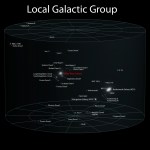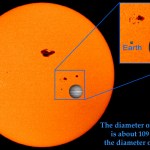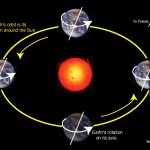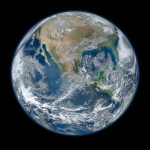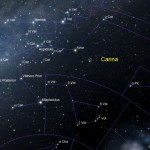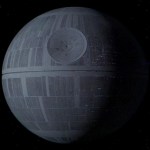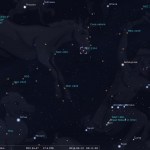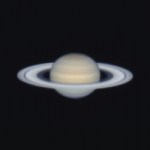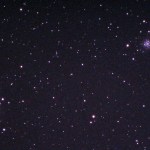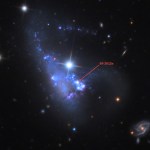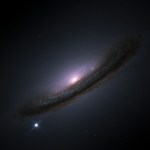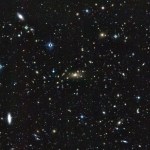Astronomy
"Is no one inspired by our present picture of the Universe? This value of science remains unsung by singers, you are reduced to hearing not a song or poem, but an evening lecture about it. This is not yet a scientific age." -Richard Feynman
Back in 2008, Time Magazine interviewed Neil de Grasse Tyson, and asked him, " What is the most astounding fact you can share with us about the Universe?" His answer was indeed a very good, true, and astounding fact about the Universe: that all the complex atoms that make up everything we know owe their origins to ancient, exploded stars, dating back…
"I soon became convinced... that all the theorizing would be empty brain exercise and therefore a waste of time unless one first ascertained what the population of the Universe really consists of." -Fritz Zwicky
You very likely know that there are four fundamental forces in the Universe: gravity, electromagnetism, and the weak and strong nuclear forces. While only some particles experience the nuclear and electromagnetic forces, anything with mass or energy -- which is everything we know of -- is subject to gravity.
Image credit: CountInfinity by Ananth.
The strong nuclear force binds all…
"The Earth reminded us of a Christmas tree ornament hanging in the blackness of space. As we got farther and farther away it diminished in size. Finally it shrank to the size of a marble, the most beautiful marble you can imagine." -James Irwin
With everything that goes on in this world, from our daily lives to concerns around the globe, it's easy to forget just how vast the Universe is, and how small we all really are. You had so much fun playing with the Interactive Scale of the Universe tool a couple of weeks ago that I had to just give you a few things to ponder. We think of the Earth,…
"When in doubt, make a fool of yourself. There is a microscopically thin line between being brilliantly creative and acting like the most gigantic idiot on earth. So what the hell, leap." -Cynthia Heimel
Once every four years, the elusive entity that is today -- February 29th -- comes along. The historical origins and urban legends associated with it are incredibly interesting, but the reason there's any such thing as Leap Day at all is because of the physics of planet Earth.
Image credit: Mrs. Snyder at the Seven Hills School.
The Earth, of course, is rotating on its axis while…
"One mustn't look at the abyss, because there is at the bottom an inexpressible charm which attracts us." -Gustave Flaubert
The deepest depths of space, out beyond our atmosphere, our Solar System, and even our galaxy, hold the richness of the great Universe beyond. Stretching for billions of light years in every direction, there are structures large and small, dense and sparse, everywhere we've ever dared to look.
Image credit: R. Jay GaBany, Cosmotography.com.
In addition to the visible, luminous matter we see in the image above, there's both non-luminous normal matter and dark matter.…
"Day after day, day after day,
We stuck, nor breath nor motion;
As idle as a painted ship
Upon a painted ocean.
Water, water, every where,
And all the boards did shrink;
Water, water, every where,
Nor any drop to drink." -Samuel Taylor Coleridge, Rime of the Ancient Mariner
Despite the discovery of dozens of worlds -- planets and moons -- in our own Solar System, as well as hundreds (soon to spill into the thousands) of confirmed planets orbiting other stars, our Earth is still unique.
Image credit: The Suomi NPP Blue Marble, NASA / NOAA.
At least, it's unique as far as we know.
A smaller,…
"Not explaining science seems to me perverse. When you're in love, you want to tell the world." -Carl Sagan
Nothing lasts forever in this Universe, not even the seemingly timeless stars in the sky. At any moment, any one of the brilliant, twinkling points of light from across the galaxy could run out of fuel, ending its life as we know it. It's happened a number of times before in recorded history, and will no doubt happen again. With a typical supernova rate of one per galaxy per century, we've got a number of nearby potential candidates for what the next supernova to occur in the Milky Way…
"What's that star?
It's the Death Star.
What does it do?
It does Death. It does Death, buddy. Get out of my way!" -Eddie Izzard
Like it was for many people, the original, very first Star Wars movie was one of my favorites as a child. And while there was a lot to be in awe of, the idea of jetting around the Universe in your own private, gargantuan structure, free from planets, Solar Systems, and even the rest of the galaxy was simply the most amazing idea to me.
Image credit: Star Wars' Wookieepedia.
That's what I wanted: a Death Star. Of course, you know what happens to the Death Star, don'…
This is a feel good story of the day - the world's first human to humanoid robot handshake, in space! The robot even sent out a tweet.
From The New York Times:
The commander of the International Space Station, Daniel Burbank, shook hands Wednesday with Robonaut. It's the first handshake ever between a human and a humanoid in space.
NASA's Robonaut was launched aboard space shuttle Discovery last February. Crews have been testing it to see how it one day might help astronauts perform space station chores.
On Wednesday, ground controllers activated computer software that enabled the robot…
"What's in a name? That which we call a rose
By any other name would smell as sweet." -William Shakespeare
Up in the night sky, just a few degrees away from Orion, one of the most identifiable constellations in the winter sky, lies a cluster of newly formed stars.
Image credit: Stellarium. As always, click on all images for the highest-res version available.
5,000 light years away, this cluster of stars is loaded with the full gamut of stellar colors, from blue to white to red, and is easily visible through any astronomical tool from simple hand-held binoculars to pretty much any type of…
"The phenomena of nature, especially those that fall under the inspection of the astronomer, are to be viewed, not only with the usual attention to facts as they occur, but with the eye of reason and experience." -William Herschel
We live in the most plentiful of scientific times, where the full extent of both our experience and understanding has expanded tremendously since the time of Herschel. You must remember that to Herschel, living in the 18th century, there were but six known planets (including Earth) in the Solar System: Mercury through Saturn.
Image credit: Daniel Dendy.
While each…
"It took less than an hour to make the atoms, a few hundred million years to make the stars and planets, but five billion years to make man!" -George Gamow
Let's pretend that, for all of our history on Earth, we had never once bothered to look up with any instruments beyond what our own eyes could offer. Imagine that all the technology we'd have would be the same -- telescopes, electronics, GPS, etc. -- as would our fundamental scientific knowledge -- Einstein's General Relativity, the Standard Model of Particle Physics, etc. -- but we had just never bothered to turn our attentions toward the…
"More days to come / New places to go
I've got to leave / It's time for a show
Here I am / Rock you like a hurricane!" -The Scorpions
It isn't just Earth, of course, where these great cyclonic storms occur, whipping across the planet and wreaking havoc as they rage above the surface. Most famous, perhaps, is Jupiter, whose great red spot has existed for as long as we've been able to see at the necessary resolution.
But one doesn't often think of Saturn when it comes to devastating storms.
Image credit: Earth-based telescope, retrieved from SolarSystemQuick.com.
Saturn, quite famously, is a…
"The Earth's atmosphere is an imperfect window on the universe... atmospheric turbulence blurs the images of celestial objects, even when they are viewed through the most powerful ground-based telescopes." -John Bahcall
There's no doubt that the Hubble Space Telescope has given us some of the most spectacular, high resolution views of the Universe. From the most distant galaxies ever seen to stars here in our own galactic backyard, the Hubble Space Telescope has simply dwarfed anything we've been able to do from Earth's surface.
Image credit: Bill Drelling.
This is the globular cluster NGC…
"The diversity of the phenomena of nature is so great, and the treasures hidden in the heavens so rich, precisely in order that the human mind shall never be lacking in fresh nourishment." -Johannes Kepler
So said the man who, in 1604, discovered the supernova that was the last to be seen, visually, within our own galaxy. Although it's likely that two others occurred subsequently, they were not visible to human eyes, and only with powerful telescopes were their remnants discovered.
But earlier this week, the first supernova of the year was discovered, in a galaxy 25 million light years away,…
"Events are the ephemera of history; they pass across its stage like fireflies, hardly glimpsed before they settle back into darkness and as often as not into oblivion. Every event, however brief, has to be sure a contribution to make, lights up some dark corner or even some wide vista of history... illumined by the intermittent flare of the event." -Fernand Braudel
The spectacular event of the day, however, isn't something that started on Earth. Rather, 93 million miles away, it was our Sun, early yesterday morning (about 38 hours ago as I write this), that had a brief... shall we say...…
"When I had satisfied myself that no star of that kind had ever shone before, I was led into such perplexity by the unbelievability of the thing that I began to doubt the faith of my own eyes." -Tycho Brahe
When we look out at galaxies throughout the Universe, we find that every so often -- about once per century -- a bright star flares up so brightly that it can, for a brief amount of time, outshine the entire rest of the galaxy!
Image credit: SN 1994D, High-Z Supernova Search Team, HST, NASA.
What's going on, of course, is not that a star is brightening, but that the very atoms composing…
"We find them smaller and fainter, in constantly increasing numbers, and we know that we are reaching into space, farther and farther, until, with the faintest nebulae that can be detected with the greatest telescopes, we arrive at the frontier of the known Universe." -Edwin Hubble
While large parts of the internet are blacked out today, in protest of SOPA and PIPA, I could think of no better way to highlight the importance of free exchange of information on the internet than by showcasing one of the most interesting, varied and intricate objects in the entire galaxy: Messier 16, better known…
"Nothing leads the scientist so astray as a premature truth." -Jean Rostand
One of the most awesome events, literally, that happens in this Universe is when stars -- giant nuclear furnaces like our Sun -- die in the most energetic way possible: a supernova.
Video credit: Max-Planck-Institut für Astronomie (Ors Hunor Detre, Oliver Krause), via YouTube.
Every star that ever lived gets two chances to end their lives in this most spectacular of fashions. The hottest, bluest, most massive stars that are born burn through their nuclear fuel incredibly rapidly, accumulating a core of heavy metals…
"I soon became convinced... that all the theorizing would be empty brain exercise and therefore a waste of time unless one first ascertained what the population of the Universe really consists of." -Fritz Zwicky
Making the entire Universe isn't easy. Even with 13.7 billion years of time, general relativity and all the known particles in the Universe, we still can't reproduce all the observations we see today.
Image credit: Canada-France-Hawaii Telescope LenS team.
What does it take to get galaxies to form and cluster together the way they do in the Universe?
The large-scale structure in the…
